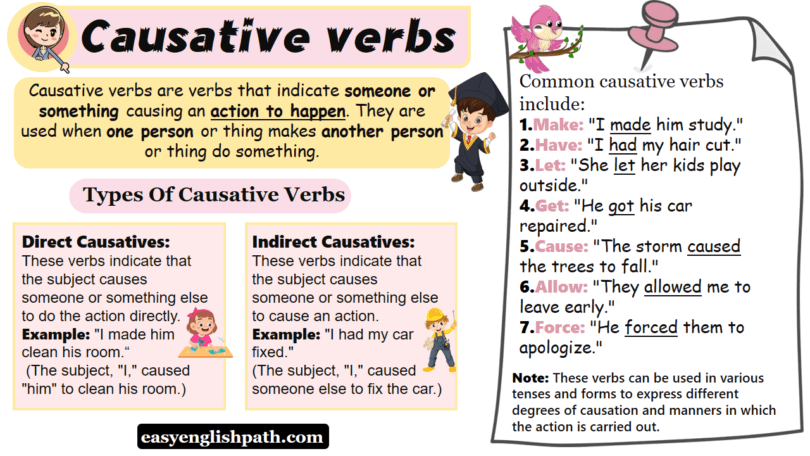Causative verbs are words that show how one person makes someone else do something or causes something to happen. They help us to explain actions where one person gets another person to do something.
Learning about causative verbs is important for good communication because they help us tp express who is doing what in different situations, like when we talk to friends or write messages.
Causative Verbs Definition:
Causative verbs are verbs that indicate someone or something causing another person or thing to do something. They express the idea of causing an action to happen rather than doing the action themselves.
- I had dinner cooked by a professional chef.
- She made him wash the dishes after dinner.
- He got his car fixed by a mechanic.
- They let me use their swimming pool.
Rules for Causative verbs
There are five main verbs we use in causative sentences in English: have, get, make, let, and help. We use these verbs to say that someone or something causes something to happen.
1. Have (Give Someone a Task to Do)
Structure: Have + object + base verb (without ‘to’)
This verb indicates that someone causes another person to do something for them.
- I had my hair cut yesterday.
- She had her house painted last summer.
- They had their dog groomed for the show.
- He had his computer repaired.
In both the above sentences, the subjects didn’t do the action themselves, they paid someone to do it for them.
2. Make (Force or Compel)
Structure: Make + object + base verb (without ‘to’)
These verbs force or convince someone to do something.
- She made her son do his homework.
- They made him apologize.
- He got his brother to wash the car.
3. Let (Allow Permission)
Structure: Let + object + base verb (without ‘to’)
it is use to indicate permission or allowing someone to do something.
- They let us use their beach house.
- She let her children watch TV.
- He let his friend borrow his car.
4. Get (Persuade Someone to Do Something)
Structure: Get + object + to + verb
“Get” is used to indicate persuasion, obligation, or arrangement, meaning that someone is made to do something, often through effort or influence.
- He helped me finish (or to finish) my homework.
- They helped us set up (or to set up) the decorations.
- The coach helped him improve (or to improve) his skills.
5. Help (Assist in Doing Something)
Structure: Help + object + (base verb / to + verb)
The verb help used to indicate assistance or aiding someone in doing something.
- He helped me fix my bicycle.
- She helped her friend move.
- They helped their neighbor mow.
6. with Other Verbs
Various other verbs can be used in causative constructions, such as force, convince, assist, etc.
- She forced him to apologize.
- They convinced her to join the team.
- He assisted them in completing the project.
Causative Verbs Examples
- She made him wait outside.
- They had their car serviced yesterday.
- He got his book signed by the author.
- I let the dog out before bed.
- We had the windows cleaned last month.
- She persuaded him to try sushi.
- He made her laugh uncontrollably.
- They got the problem fixed quickly.
- She had her hair styled for the party.
- We let the kids play in the garden.
Common Mistakes with Causative Verbs
1. Make (Forcing Someone to Do Something)
❌ She made me to cry.
✅ She made me cry.
2. Let (Giving Permission)
❌My mom let me to go out.
✅ My mom let me go out.
3. Have (Assigning a Task)
❌ I had my friend to call you.
✅ I had my friend call you.
4. Get (Persuading or Arranging for Someone to Do Something)
❌ I got my sister clean my room.
✅ I got my sister to clean my room.
5. Help (Assisting Someone)
❌ Incorrect: He helped me to finish the project.
✅ Correct: He helped me finish the project.
You May Also Like






